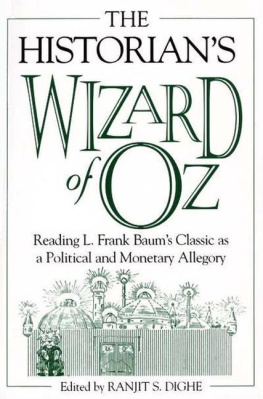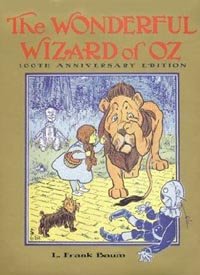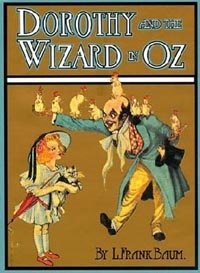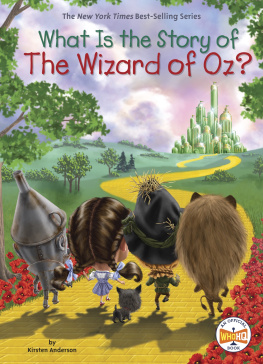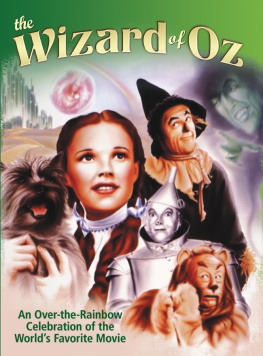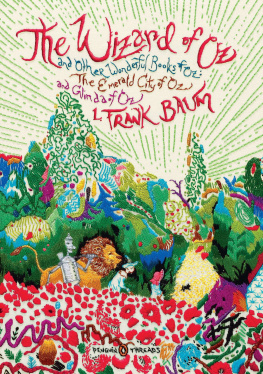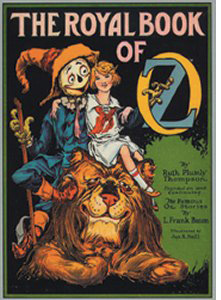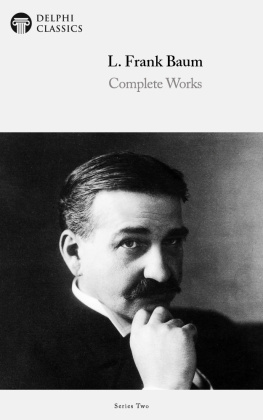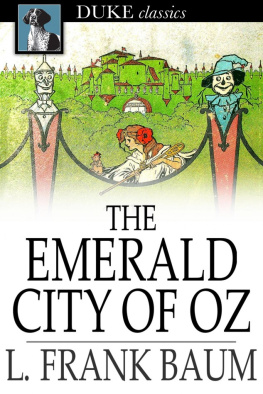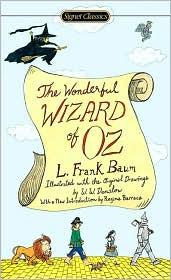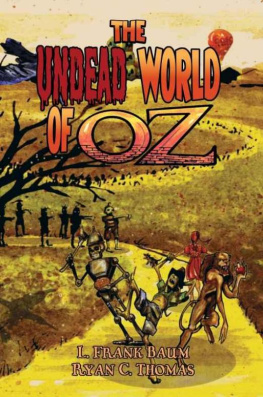Contents

THE
HISTORIANS
W I Z A R D
of O Z
Ranjit Dighes new book will be of immense interest to scholars seeking to understand Baum and his classic, and to teachers who wish to use Baums story as a platform for discussing one of the crucial periods in American political and economic history. Although written in a straightforward and engaging style, the book is based on an impressive understanding of the primary and secondary sources. Professor Dighe has chosen judiciously among conflicting interpretations, developed new interpretations of his own, and dealt sensitively with the thorny issue of Baum's intentions. The Historians Wizard of Oz will be the definitive work for a long time to come.
Hugh Rockoff, Professor of Economics, Rutgers University
With this book, Ranjit Dighe combines the economists knowledge of monetary matters with the historians sensibilities of the past to help us understand the context of Americas classic childrens story. His annotations are clear and concise, fair and balanced. Put simply, this is the best commentary we have on L. Frank Baums Wonderful Wizard of Oz.
Oz fans will discover more of American society than they could have possibly imagined in their favorite book. History buffs will enjoy seeing how the political, cultural, and economic issues of the late nineteenth century are reflected in the setting for Oz.
David B. Parker, Professor of History, Kennesaw State University
Readers will benefit mightily from the expertise this historical-minded economist brings to bear on the famous childrens tale. It is with great pleasure and confidence therefore that I recommend The Historians Wizard of Oz.
Gene Clanton, author of Congressional Populism and the Crisis of the 1890s
The Historians Wizard of Oz is a comprehensive treatment of the relationship between The Wonderful Wizard of Oz and the political events in America just before the turn of the century. In a scholarly fashion, Dighe dispels many cherished myths about Baums political beliefs and the intentions behind his writing. In one volume, Dighe assembles varied source material to help the reader see the real (and imagined) links between Oz and Populism. The Historians Wizard of Oz is a welcome addition to the literature about Baum and politics.
Michael Gessel, Editor-in-Chief, The Baum Bugle (198892)
M.B.A. students are just like everybody elsethey love a good story. Dighe tells the story behind the story. He tells it with verve and, in the process, teaches some good economics.
Robert L. Greenfield, Professor of Economics, Fairleigh Dickinson University
Library of Congress Cataloging-in-Publication Data
The historians Wizard of Oz : reading L. Frank Baums classic as a political and monetary allegory / edited by Ranjit S. Dighe.
p. cm.
Includes bibliographical references and index.
ISBN 9780-27597418-3 (hardback) ISBN 9780-31309242-8 (ebook)
1. Baum, L. Frank (Lyman Frank), 18561919. Wizard of Oz. 2. Baum, L. Frank (Lyman Frank), 18561919Political and social views. 3. Baum, L. Frank (Lyman Frank), 18561919KnowledgeEconomics. 4. Politics and literatureUnited StatesHistory20th century. 5. Childrens stories, AmericanHistory and criticism. 6. Political fiction, AmericanHistory and criticism. 7. Fantasy fiction, AmericanHistory and criticism. 8. Economics in literature. 9. Money in literature. 10. Oz (Imaginary place) 11. Allegory. I. Dighe, Ranjit S., 1965- PS3503.A923 W6345 2002 813'.4dc21 2001133084
British Library Cataloguing in Publication Data is available.
Copyright 2002 by Ranjit S. Dighe
All rights reserved. No portion of this book may be reproduced, by any process or technique, without the express written consent of the publisher.
Library of Congress Catalog Card Number: 2001133084
ISBN 9780-27597418-3
EISBN 9780-31309242-8
First published in 2002
Praeger Publishers, 88 Post Road West, Westport, CT 06881
An imprint of Greenwood Publishing Group, Inc.
www.praeger.com
10 9 8 7 6 5 4 3 2
Every reasonable effort has been made to trace the owners of copyright materials in this book, but in some instances this has proven impossible. The editor and publisher will be glad to receive information leading to more complete acknowledgments in subsequent printings of the book and in the meantime extend their apologies for any omissions.
To Julia
Contents
2. If I Only Had a Brain:
A Primer on Gold, Silver, and the American Monetary System
3. Populism Will Put Them to Sleep:
A Short History of the Populist Movement of the 1890s
Appendix A: Another Fiat-Money Metaphor,
from The Marvelous Land of Oz
Preface
Like millions of children around the world, I grew up watching MGMs splendid 1939 movie The Wizard of Oz every year on television. After watching it on the big screen years later as a college student, I came away with a new appreciation for the film, not only for its dazzling color cinematography and great performances, but also for the often wry and witty dialogue. Watching the movie on a campus thick with political activism, one easily heard political overtones in such lines as Im a very good manIm just a very bad wizard and Pay no attention to that man behind the curtain! Years later, as a graduate student in economic history, I became fascinated by the late-nineteenth-century Populist movement and the 1896 presidential candidacy of William Jennings Bryan. When I pitched a Populismrelated research idea to one of my advisers, David Weiman, he suggested I take a look at a journal article by Hugh Rockoff titled The Wizard of Oz as a Monetary Allegory, and showed me the syllabus for an undergraduate class he was teaching that actually used L. Frank Baums original book version of the story as a required reading. Upon reading Rockoff s article, I was instantly hooked and decided to incorporate it into my own teaching of American economic history.
Rockoff s article was a hit with my students, and I decided the next semester to copy Professor Weimans example and have the students read Baums book, too. Most of the class, myself included, had never read the book before. While reading The Wonderful Wizard of Oz under the impression that it was a conscious monetary allegory (an impression that I now realize was inaccurate), I was continually struck by the parallels between Baums book, written in the late 1890s, and the political economy of that time. My students loved the book, too, and were intrigued by the allegorical interpretation; but, without much prior exposure to 1890s economic history, most of them did not appear to draw many connections between the book and
monetary populism. I drew two conclusions: first, that in using the Oz story to get Populism across, there was no substitute for reading the book, since it differed from the movie in several key respects and was a delightful read in its own right; and, second, that I needed to find a way to integrate more tightly Baums story and 1890s economic history. The Historians Wizard of Oz represents my attempt to do just that.
While political interpretations of Baums book have taken on a life of their own, we must be careful to get the details right as regards not just 1890s political and economic history but also L. Frank Baums politics and likely intentions. Baum left behind no concrete evidence that he wrote the book as a political allegory, and, as far as we can tell, virtually nobody read it as one until more than sixty years later, when Henry Littlefields The Wizard of Oz: Parable on Populism was published in 1964. concludes that while we can no longer take the leading political interpretations of

